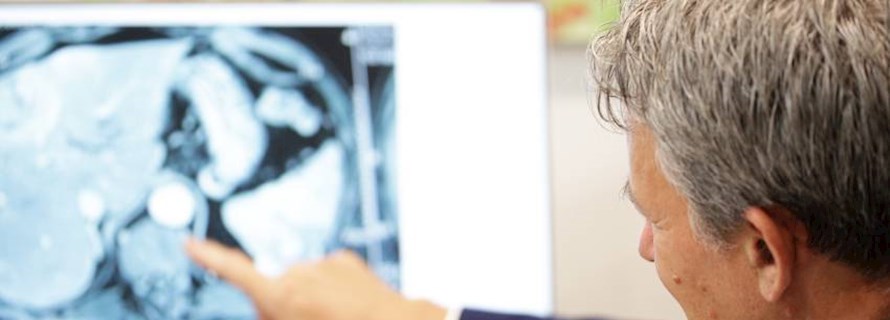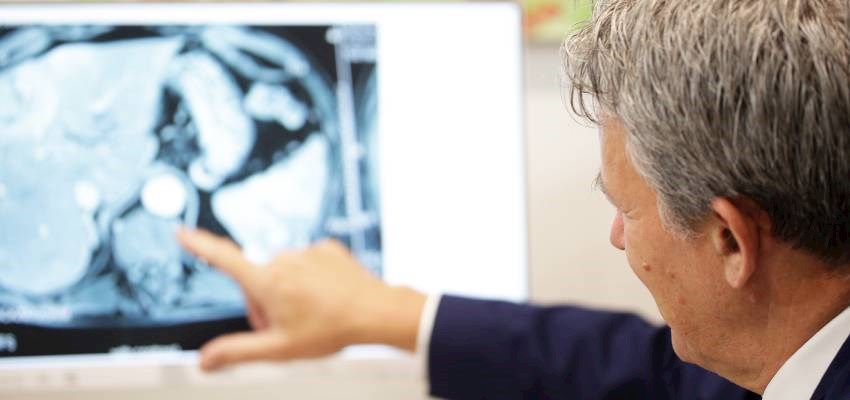Liver conditions
Conditions we treat in The Liver Unit
As well as liver damage and acute liver failure, we treat a number of other common problems, such as:
Malignant conditions
Benign conditions
Autoimmune and inherited diseases

Liver metastases
A liver metastasis is a cancerous tumour that has spread to the liver from a different organ in the body, for example from the lungs, breast, bowel, pancreas, stomach and neuroendocrine. It's also called secondary liver cancer. Different to primary liver cancer which originates in the liver and most commonly affects individuals who have risk factors such as hepatitis or cirrhosis.

Hepatocellular carcinoma (HCC)
Hepatocellular carcinoma (HCC) or Hepatoma is the most common type of primary liver cancer. HCC arises from the main cells of the liver known as the hepatocytes. Whilst ordinarily confined to the liver it may, on occasion, spread to other organs. More common in men than women, HCC occurs mostly in people with cirrhosis of the liver.

Pancreatic cancer
For many the first indication of a problem is when the disease is quite advanced as the early signs are often not obvious. The main symptoms that may indicate early onset of pancreatic cancer are abdominal pain, joint pain, jaundice, nausea, muscle wasting and skin blemishes. We routinely perform pancreatico-duodenectomy (known as the Whipple procedure) and distal pancreatectomy operations performed for tumours at the head and body/tail of the pancreas.

Biliary cancer
The incidence of cholangiocarcinoma, cancer of the bile duct, has steadily increased over the years. Patients commonly have jaundice as a result of biliary obstruction. Our consultants will discuss the location and stage of any tumours alongside possible treatment options, which might include hepatic resection surgery, chemotherapy, alone or in combination with photodynamic therapy (PDT).

Neuroendocrine cancer (NETs)
Neuroendocrine tumours originate from our cells that make hormones. NETs develop when the cells begin to grow abnormally, with common sites including the stomach, lungs, pancreas and intestine. NETs are often slow growing, although a minority can grow aggressively. Led by Professor Martyn Caplin, our unit has brought together a team of specialists to treat and support our patients with neuroendocrine tumours.

Decompensated liver disease and liver cirrhosis
Cirrhosis is the end result of many causes of liver disease and driven by the formation of liver scarring or fibrosis. For many the first indication they have cirrhosis is when they develop advanced complications such as fluid retention, bleeding or confusion as a result of decompensation. Caring for our patients with advanced liver disease requires a multidisciplinary approach, including specialist input from our hepatologists and inpatient care working alongside our intensive care team and access to specialist procedures such as TIPS insertion.
The main symptoms that may indicate the early onset of a liver, pancreatic or hepatobiliary problem are abdominal pain, joint pain, jaundice, nausea, muscle wasting, and skin blemishes
Professor Kito Fusai, Consultant General HPB Surgeon
Investigations and diagnosis
Liver and pancreatic disease can present itself in many different ways. You may have been told by your GP a scan or blood test looks abnormal and you are obviously concerned and wish to see a specialist.
For others, it may be you’ve been told you have cirrhosis of the liver, fatty liver disease or you have a viral disease like Hepatitis B or C. Once your diagnosis is clear, here at our liver unit we take care of simple to very complex cases.




How to refer
Patients are referred to us not just from London but also from around the UK and overseas. A significant number are from patients who are seeking a second or a third opinion. If you would like to refer a patient or you are a patient who would like to book an appointment with The Wellington Hospital Liver Unit team, please call us on:
+ 44 (0) 20 7483 5933 (for HPB and Liver surgery enquiries)
+ 44 (0) 20 7483 5932 (for Liver medicine enquiries)
or email Liver.Unit@HCAHealthcare.co.uk